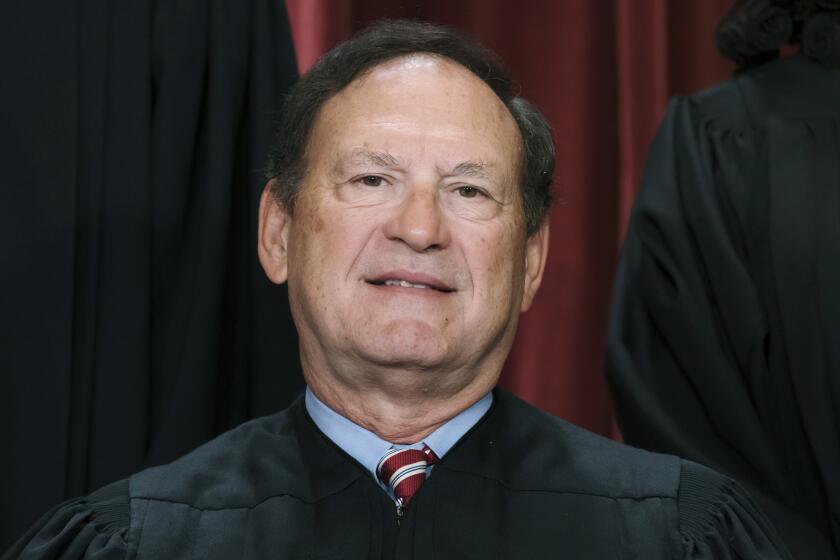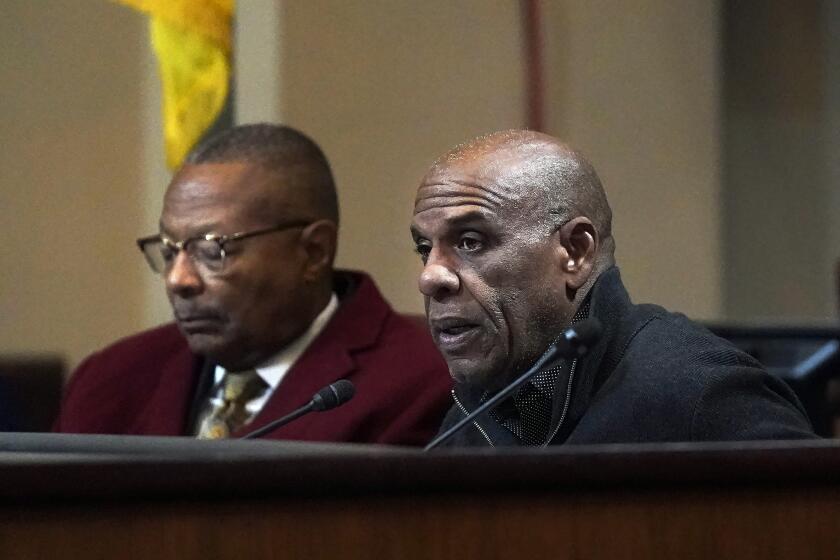How GOP Leaders Got Their House in Order
She’d been handpicked by Speaker Newt Gingrich just one week before to move up in the leadership, and now Rep. Jennifer Dunn was heading into the basement of the Capitol for her first big job: presiding over an unprecedented meeting of her party colleagues to air acts of betrayal, perfidy and coup-plotting against her patron.
The lawmaker from Washington state had spent much of the day preparing in minute detail for this dubious debut. She was worried that the party could come unglued in the next three hours. She was not alone.
After weeks of palace intrigue that culminated in a failed effort to dump Gingrich earlier this month, many House Republicans expected war as they headed into Wednesday night’s session.
Three hours later, peace had broken out--or at least a truce. Republicans wept; Republicans laughed. Wayward leaders repented; rebels apologized. And Gingrich emerged stronger than he had been for months.
It was a remarkable crossroads for the party, which for months had been riven by factional strife.
And it was an even more remarkable watershed for Gingrich, who had been in free fall from the vertiginous heights of power and popularity he enjoyed after he masterminded the 1994 GOP takeover of Congress. The Georgian had been under sniper fire for months by a small group of conservative malcontents, and surrounded by lieutenants who were clearly tantalized by the prospect of succeeding him.
Now, suddenly, Gingrich’s fall has been arrested, even if his ascent to old heights is unlikely. His rivals have been humiliated. And his party’s footing has been restored--at least, or so Republicans hope, long enough to pass tax-cutting and budget-balancing legislation that they can hold up to the voters next year.
That assessment of the dramatic day and its broader significance emerged from a series of interviews with many Republicans and staff members, both in and outside the GOP leadership.
The months of turmoil and disarray that led House Republicans into that extraordinary meeting were a far cry from the stunning display of party discipline and loyalty to Gingrich that Republicans had shown in their first two years of controlling Congress.
Republicans nearly lost control of the House in 1996. Gingrich faced charges of ethics violations as the new Congress was convening early this year. Cracks between the speaker and his lieutenants began to widen.
Those cracks turned abruptly into chasms in early July as the lieutenants offered a sympathetic ear to conservative rebels who found Gingrich’s leadership increasingly ineffectual. When the news broke last week that a cabal had planned an aborted coup, it set off bitter intraparty warfare.
House Majority Leader Dick Armey of Texas, second in the GOP leadership behind Gingrich, immediately denied any involvement in the plot. A darling of the right, the former economics professor had long been considered the heir apparent for the speakership. Now, with many Republicans openly skeptical of his denial, all that was in doubt. He circulated an emotional letter to House Republicans defending himself and blaming other leaders.
House Majority Whip Tom DeLay, another Texan, was most directly implicated in the plot. Third in the GOP pecking order, DeLay aroused suspicions particularly among GOP moderates. He won his leadership post over Gingrich’s opposition by beating the speaker’s best friend.
House GOP Conference Chairman John A. Boehner of Ohio, fourth in line, could honestly say he was not involved in the late-night meetings at which other leaders speculated about who would move in when Gingrich moved out. He was known to have been embittered because the speaker had blamed him for the party’s failure to communicate a compelling political message. When other leaders met to discuss the succession, they cut Boehner out because they did not trust him.
Bill Paxon of New York had the most to explain because he owed Gingrich the most. Unlike the others, who had been elected to their leadership posts, Paxon had been appointed by the speaker to be chairman of the leadership. A young, rising star, he had been identified by dissidents as their choice as Gingrich’s successor. He resigned from the leadership after the coup plot was exposed.
Those were the four whom Gingrich loyalists wanted to haul before the House Republican membership for an explanation. Initially, Gingrich had said he opposed such a meeting, but he did not block one. His critics suspected that he welcomed a chance to turn up the heat on his wayward lieutenants.
Gingrich loyalists strategized with the speaker on ways to keep the Wednesday meeting under control. They decided to lay down rules that would let each leader talk for five minutes and limit other members to two minutes. Gingrich was prepared to pull the plug on the whole thing if it got ugly.
The rebels, meanwhile, were spooked by rumors that Gingrich was going to use the opportunity to dump the other leaders and install his own slate. Sources close to Gingrich denied such a plan.
The dissidents huddled before the meeting and decided not to speak, assuming the whole thing would be orchestrated by Gingrich and his allies to humiliate them.
Gingrich opened the meeting with a biblical exhortation to forgiveness: “Bless those who persecute you; bless and do not curse them.” Then, one by one, the implicated leaders rose to the podium.
DeLay gave the first clear sign that the meeting was not going to descend into a head-rolling, back-stabbing brawl. Breaking his long public silence, he read from a prepared statement. He had struggled all day with what he should say and, he said later, was finally guided by the biblical injunction “The truth shall set you free.”
Clearly shaken, DeLay dropped the biggest bombshell of the session: He acknowledged that he had told the conservative dissidents that he would support an effort to oust Gingrich. He regretted it. He didn’t mean it. He was tired.
As he finished, he received a warm, long round of applause. “At that point,” said one Republican, “it became clear that the vast majority of the conference understood, didn’t agree with him, but wanted to put it behind him.”
Armey acknowledged that he had joined the other leaders in “what-if scenarios” of possible successors. Armey, who had been widely quoted as complaining in private of “Newt fatigue,” acknowledged that he and Gingrich had a lot of differences, but he continued to deny that he had intended to oust the speaker.
Paxon drew the first standing ovation with an emotional plea to his colleagues to let his be the last head to roll. He moved some to tears when he said, “Enough is enough.”
Then began a parade to the microphone of the rank and file.
Two of the dissidents spoke--Lindsey O. Graham of South Carolina, the ringleader, and Sue Myrick of North Carolina. Graham, while apologizing if his revolt had claimed any innocent victims, reiterated his concerns that Gingrich’s leadership was hurting the party.
It was Sonny Bono of Palm Springs whose self-deprecating humor pulled the Republicans out of their funk. Back when his sinking career as an entertainer was taking him from one bad TV show to another, he said, he realized he had hit bottom when he was chewed out for flubbing a line as a guest star on “Fantasy Island.” He left his colleagues rolling in the aisle when he said, “That was God’s way of saying, ‘Sonny it’s time to put this behind you.’ ”
Gingrich’s supporters left the three-hour meeting elated, but still suspicious of the rebels.
The feeling was mutual. Few rebels would speak about the meeting, but one said privately of the leadership: “We’re going to give them our full support until another series of crises.”
More to Read
Get the L.A. Times Politics newsletter
Deeply reported insights into legislation, politics and policy from Sacramento, Washington and beyond. In your inbox three times per week.
You may occasionally receive promotional content from the Los Angeles Times.







